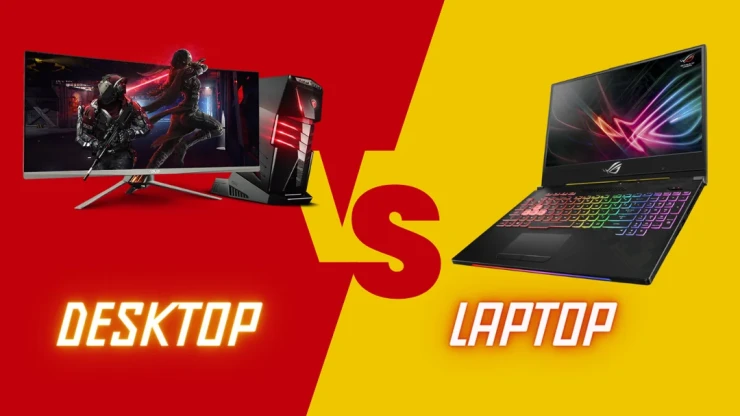
The Great Debate — Laptop or Desktop?
If you’re thinking about buying a new computer in 2025, you’ve probably faced this classic question: Laptop or desktop — which is more user-friendly? In today’s fast-paced world, where remote work, gaming, creative projects, and everyday computing all demand different things, this choice is more important than ever.
Maybe you’re a student, a professional, or someone who just wants a reliable computer for browsing and streaming. Whatever your use case, understanding the advantages and drawbacks of each option can save you time, money, and headaches.
So, grab a cup of coffee, and let’s explore the world of laptops and desktops to help you decide which one truly fits your needs.
Which Is Better: Laptop or Desktop Computer?
There’s no one-size-fits-all answer. Both laptops and desktops have unique strengths and weaknesses. Here’s a quick overview:
Laptops offer mobility, convenience, and an all-in-one package. Perfect for users who need to work or play anywhere.
Desktops deliver power, upgradeability, and often better ergonomics — ideal for stationary setups requiring high performance.
Let’s dive deeper.
Can a Laptop Do Everything a Desktop Can?
Technically, yes and no. Laptops have come a long way, and many can now perform tasks once reserved for desktops — think video editing, gaming, programming, and multitasking. Powerful laptops with dedicated GPUs and high-refresh-rate displays blur the lines between mobility and performance.
However, some differences remain:
Power and Cooling: Desktops generally pack more powerful CPUs and GPUs because they have better cooling systems, which means sustained high performance. Laptops often throttle performance to avoid overheating.
Upgradeability: Most laptops are limited in what you can upgrade — usually just RAM and storage. Desktops allow swapping out almost every part, from graphics cards to power supplies.
Screen Size and Ergonomics: Desktop setups typically support larger monitors and more ergonomic peripherals, reducing strain during long sessions.
In short, laptops can do a lot, but desktops still hold the edge in raw power and flexibility.
What Are the Disadvantages of a Laptop?
While laptops are fantastic for portability, they come with some compromises:
Limited Upgrades: Once purchased, you’re mostly stuck with the specs you bought, which can limit lifespan.
Battery Life: Batteries degrade over time, and heavy tasks drain them quickly.
Heat Management: Smaller bodies mean laptops can heat up quickly, potentially slowing performance or affecting longevity.
Cost: High-performance laptops tend to be pricier than equivalent desktops.
Ergonomics: Working long hours on a laptop without external peripherals can lead to posture problems and discomfort.
Why Desktops Still Have a Place in 2025
Despite the surge in laptop popularity, desktops continue to be the go-to for many reasons:
Customization: Gamers and creative professionals love desktops because they can tailor hardware precisely to their needs.
Better Cooling: Larger chassis allow efficient cooling, which supports longer heavy workloads without throttling.
Cost-Effectiveness: Desktops often offer more bang for your buck, especially if you build your own or upgrade over time.
Ergonomics: Separate keyboards, mice, and large monitors encourage a healthier workspace setup.
User-Friendliness: What Does It Really Mean?
When we say “user-friendly,” what do we mean? Is it ease of use, convenience, performance, comfort, or all of these?
For mobile users, a lightweight laptop with good battery life and fast startup is user-friendly.
For power users, a desktop with a comfortable setup and high performance is friendlier.
For beginners, intuitive interfaces and minimal maintenance matter most.
So, user-friendliness is subjective and tied to your unique needs.
Real-Life Examples and Anecdotes
Meet Sarah, a freelance graphic designer. She switched to a powerful desktop with a dual-monitor setup to speed up her video editing workflow. She finds the ergonomic setup saves her from neck pain and lets her work for longer hours comfortably.
Jake, a college student, prefers his laptop because he moves between classes, the library, and home frequently. The laptop’s portability and all-in-one convenience help him stay productive on the go.
A recent study by TechRadar revealed that 60% of professionals working remotely preferred laptops for flexibility, while 40% favored desktops for better ergonomics and power.
How to Choose What’s Right for You?
Here’s a simple checklist to guide your decision:
Do you need mobility? Go for a laptop.
Are you doing heavy video editing or gaming? Desktop might be better.
Is your workspace fixed and ergonomic comfort a priority? Desktop wins.
Do you want an all-in-one device with minimal setup? Laptop.
Are you budget-conscious and want upgrade options? Desktop.
The User-Friendly Computer Is the One That Fits Your Life
There’s no universal winner in the laptop vs. desktop debate — it all comes down to your lifestyle, work habits, and preferences. Laptops excel in flexibility and convenience, while desktops offer unmatched power and comfort for stationary setups.
Ask yourself: Where will you be using your computer most? What tasks do you want to accomplish? How much upgradeability do you want?
Answer these honestly, and you’ll find the user-friendliest computer for 2025 that makes your digital life smoother and more enjoyable.
Ready to make your decision? Why not start by listing your daily computer tasks and work environment? The clearer you are on your needs, the easier it is to choose the perfect device.










Post Your Comments